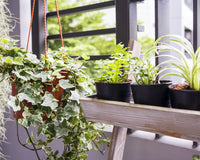Many people are thinking about growing their own garden this year. Starting your own organic garden is a great thing to do, for yourself, family and planet. Organic gardening to grow your own food and other resources can be very rewarding. But there is a lot that can go wrong too. In order to avoid some common pitfalls, here are 7 things to do before you start an organic garden:
1. Learn About Permaculture and Organic Gardening Ideas
Before you dive headlong into growing your own, it can be helpful to look into the concepts and ideas that can inform best practice in an organic garden. Permaculture, for example, is a blueprint for sustainable food production and sustainable living. It provides a series of ethics, design principles and practices that can help you get off to a good start.
At the heart of permaculture are three central ethics: care for our planet, care for humanity, and fair share (or return of surplus into the system). It's all about working with nature rather than fighting it to meet these goals. Learn more about this and other organic gardening ideas and you will have a firmer foundation for your own gardening efforts.
2. Get To Know Your Garden
Before you start sowing and growing, another key priority should be getting to know your garden. It might sound obvious, but you need to know your garden in order to make the right choices and find the right plants for the right places.
Make sure you understand the climate and microclimate where you live. Look at sunlight and shade in your garden, and how wind and water move across and through the site. Look at the soil where you live, and understand its strengths and weaknesses when it comes to drainage/ moisture, fertility and pH.
3. Think About Your Own Specific Needs
Many first time gardeners make the mistake of trying to create some 'perfect' garden, without actually considering their own specific needs and wishes. A great garden can be both beautiful and productive. To make sure you make the most of the space, you should obtain as high a yield as possible.
But it is important to think about what you need and want to grow. Think carefully about what exactly you want to achieve in your garden – and when growing edible crops, what you and your family actually enjoy eating.
4. Get a Composting System in Place
One of the most important things in an organic garden is maintaining fertility over time. In order to make sure that you are able to do so, you need to think about this up front. Before even thinking about making new vegetable beds or planting areas, get a composting system in place.
If you do not already compost biodegradable waste at home, this should be a top priority. Set up a system right away. You'll not only prevent waste with such a system. It can also provide you with good quality material to return nutrients to the soil in your garden.
5. Set Up a Rainwater Harvesting System
Another key priority should be thinking about water. Your goal should be to manage water effectively on your property. With careful garden design, you can avoid issues when there is too much of it, and take steps to keep water around.
Water is stored in your garden in plants and in the soil. But you can also collect and store rainwater that falls on roofs to use in watering your plants during drier periods. Attach rainwater barrels, butts or other containers to guttering and down spouts on your home and any other garden structures to collect and make use of this precious resource.
6. Decide on a Gardening Method or Methods
Before you rush into anything, it is a good idea to think about which type of gardening you would like to do. When people think about growing their own, a typical vegetable plot filled with annual crops is likely to spring to mind.
But it is important to recognize that annual production in a typical plot or raised bed is not the only way to grow your own food at home. Of course, in small spaces, you can grow a lot of food and other plants just in containers. Thinking about vertical gardening techniques can help you make the most of the space. But forest gardening - planting with perennials – is another low maintenance option to consider.
7. Welcome Wildlife To Your Garden
Before you get started with growing edible crops in an organic garden, it can be helpful to take steps to encourage beneficial wildlife to arrive. In an organic garden, you do not garden alone. You have a range of helpers – from earthworms, to pollinators, to predators – that keep the ecosystem in balance and allow you to garden in a more sustainable way.
Boost biodiversity and you will find it a lot easier to garden long term. Plant for wildlife around the edges of your garden, and create diverse habitats for wildlife to enjoy. If you already welcome wildlife to your garden, the ecosystem will be stronger and you stand a better chance of succeeding in your new food producing garden.




